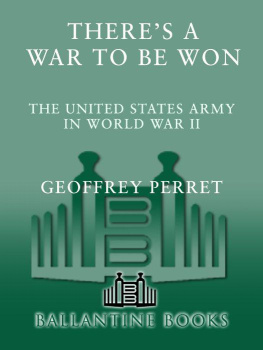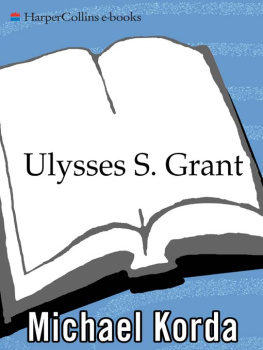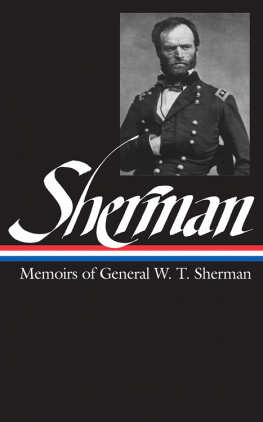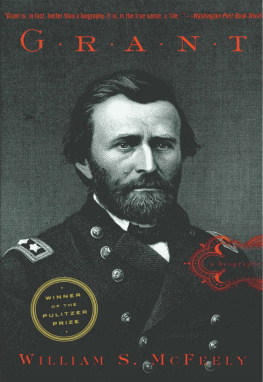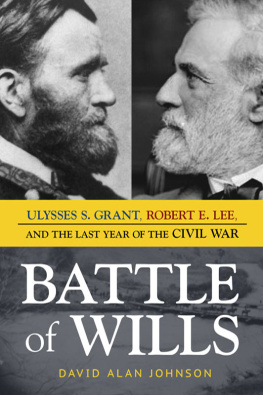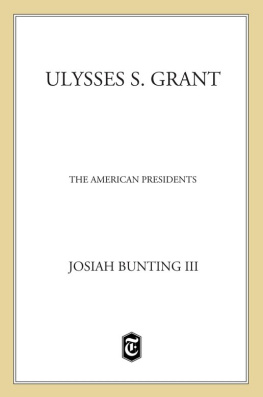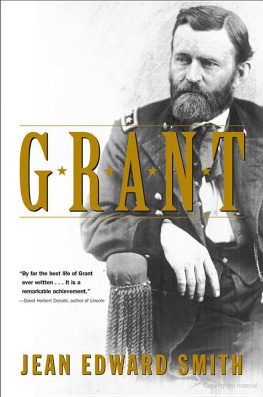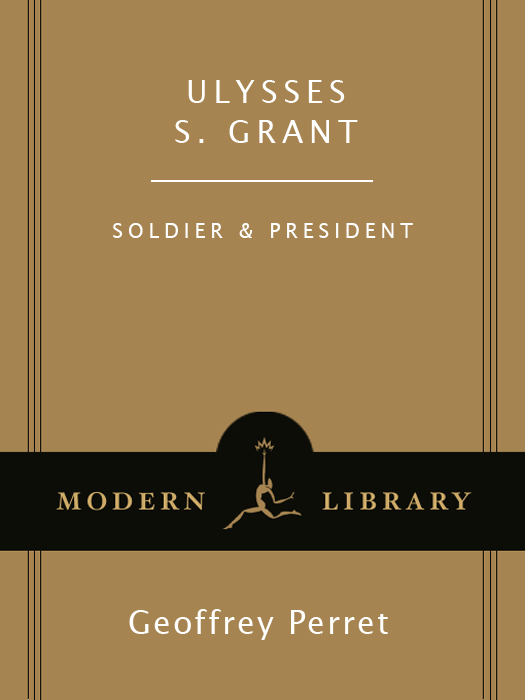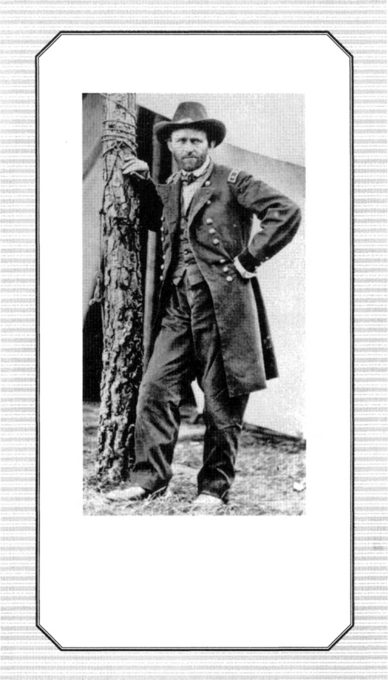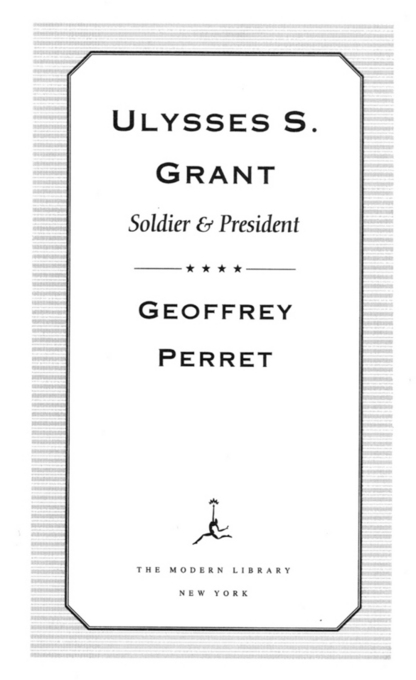Copyright 1997 by Geoffrey Perret
All rights reserved under International and Pan-American Copyright
Conventions. Published in the United States by Random House, Inc., New York, and simultaneously in Canada by Random House of Canada Limited, Toronto.
Library of Congress Cataloging-in-Publication Data
Perret, Geoffrey.
Ulysses S. Grant : soldier and president / by Geoffrey Perret.
p. cm.
eISBN: 978-0-307-56088-9
1. Grant, Ulysses S. (Ulysses Simpson), 18221885. 2. PresidentsUnited StatesBiography. 3. GeneralsUnited StatesBiography. 4. United States. ArmyBiography. I. Title.
E672.P44 1997 973.82092dc21
[B] 97-9171
Random House website address: http://www.randomhouse.com/
v3.1
C ONTENTS
L IST OF M APS
C HAPTER 1

I W ONT G O
W hen Ulysses Grant came mewling and spluttering into the world on April 27, 1822, in the remote settlement of Point Pleasant, Ohio, the American West was broad and greenthe color of hope, of spring, of youth. The line of permanent settlements ran from the Wisconsin dells down to New Orleans. The nation had few decent roads, and its highways were the big riversthe Hudson and the Susquehanna, the Delaware, the Ohio and the mighty Mississippi. The spring thaw each year unleashed a swiftly gathering stream of flatboats onto the Ohio River, carrying settlers from the East to claim a piece of the western future.
Life on the frontier was vigorous, the pace of change rapid. The hand of government was light upon the land and its people. Nowhere on Earth were people so free to move around, to speak their minds, to make money, or just make a new start as they were in the West. But this frontier was no earthly paradise. The western lands were driven by impatience, their privations made tolerable to many only by the heavy consumption of corn licker and vinegary wines wrung from indifferent grapes, from gulping down coarse beers stinking of yeast and rough applejack that brought a few fleeting hours of oblivion, followed by a headache that was slow to clear. Frontier life was cruelly hard on women, who fought never-ending battles against dirt, poverty and disease, a struggle that made many look and feel old at fortyif they managed to survive that long. Families were large, but death reaped a terrifying harvest among infants and small children. To preserve a familys name and make some provision for old age, there was safety only in numbers.
The land they farmed, fished and hunted on had been wrested from the original inhabitants only since the Revolution. Many an early dwelling was a blockhouse, half buried in the ground and fortified against Indian attack. The War of 1812 had ended with the crushing defeat of Indian tribes from the Canadian border to the Gulf of Mexico. Their abandonment by the British broke forever the power of Native Americans to resist the white mans advance to the Mississippi.
Massacres were the stepping-stones on the advance over the Alleghenies and into the dark green forests that cloaked the reverse slopes with huge oaks, sycamores and black walnut trees. The West was haunted in its winning. By the standards of the long-settled East, with its Indian wars now behind it, the western frontier when Grant was born was peopled by savages of every description. The veneer of civilization that separated the white man from the red was so thin that when conflict erupted it took an act of faith, or denial, to believe it even existed.
The settlers were almost without exception simple people, boasting little education or refinement. When they fell ill, they treated themselves with sheeps-turd tea or potions that included human urine. As with farmers and artisans everywhere, theirs was a society where the hand that shook yours was almost certain to be strong and horny, with fingernails broken and black. The familiar elements of daily existencethe tick-infested bearskin coat hanging from a nail behind the door, the powder horn grubby with frequent handling on the bench next to the long Kentucky rifle, the jar of bear grease that men rubbed into their long, lank hair in a doomed pursuit of elegance, the feeble tallow candles and the whale-oil lamps with rags floating in them for wicks that filled the tightly closed, poorly ventilated small log houses with a smell of smoked fish, the itchy, louse-harboring homespun garmentswere the fulfillment of nothing. They simply made a rude existence possible.
The hardships and privation of frontier life were there to be transcended, not embraced, the first muddy rungs on the ascent to a better life. Ulysses Grant was fortunate in having a father, Jesse Root Grant, who had already left the lowest rungs behind by the time his first child was born and was rapidly scaling the middle section of the social and economic scale. By 1822 Jesse was well on his way to putting the harshness and squalor of the typical frontier existence behind him. Jesse was a frontier success story, one of the handful who had made it. He had not risen to prosperity from nothing, but from less than nothingfrom being the abandoned child of a drunken wastrel of a father who had squandered a substantial inheritance on rotgut whiskey.
The Grants had been established in America early. Jesses ancestors, Matthew and Priscilla Grant, landed in Plymouth, Massachusetts, one day in the summer of 1630 aboard the John and Mary. They were country people from Dorset, one of the most picturesque counties in southwest England. By the time of the Revolution, descendants of Matthew and Priscilla formed the core of a moderately prominent family in Connecticut. Jesses father, Noah Grant, claimed to have fought more than six years for American independence, beginning as a minuteman standing on Lexington Green when the first shots were fired and ending the war as a captain in the Continental Army. But neither the Revolutionary War records of Connecticut nor those in the National Archives contain any confirmation of his claim.
What is not in dispute is that Noah married during the Revolutionary War and his wife bore him two sons, but toward the end of the struggle, she died. What steadiness marriage and a settled family life might have provided was gone. Over the next five or six years he drank steadily, possibly heavily, and used up the inheritance that five generations of Grants had thriftily accumulated. His property and money gone, Noah did what countless Americans have done sinceheaded west to make a fresh start. He dumped his elder son, Solomon, on his parents-in-law and, taking his younger son, Peter, for companionship, lit out for western Pennsylvania. He wound up in a hamlet called Greensburg, a desolate spot twenty miles southeast of Pittsburgh, which was not yet a town, merely a remote frontier village of five hundred inhabitants.
To many, Greensburg might seem a better place to escape from than to, but for Noah Grant it was a kind of boozy Nirvana deep in the forest. Greensburg was located in Westmoreland County, whose role in the frontier economy consisted largely of brewing cider, beer and whiskey and shipping them downriver to Ohio and Kentucky. Here was a place where a hard-drinking man could pass for a (wobbly) pillar of the community. Noah scraped together a living of sorts as a trader in animal skins and married a young widow of these parts, Rachel Kelly. She bore him seven children and stoically shared his poverty. Rachels fourth child was Jesse Root Grant, born in January 1794, just as the frontier burst into flames.


